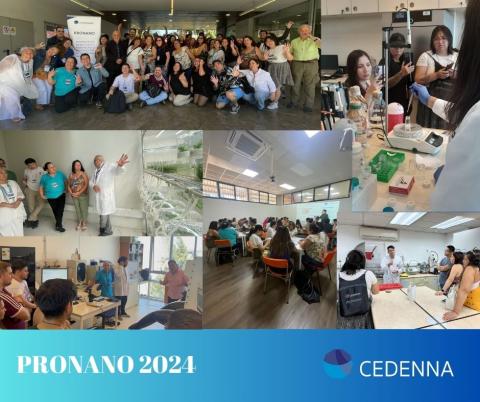
- In addition to receiving theoretical classes from prominent researchers, including two National Prize winners for Exact Sciences, teachers had the opportunity to participate in practical experiments, including the production of their own nanoparticles, guided by expert scientists in areas such as nanomedicine, nanomagnetism, nanobiotechnology, nanosafety, and development of materials with nanotechnology.
The ninth edition of ProNano, the most significant event in the field of nanoscience and nanotechnology aimed at Chilean teachers, was held on Thursday, March 14, at the Eduardo Morales Santos Research Centers Building of the University of Santiago de Chile ( USACH). Organized by the Center for Nanoscience and Nanotechnology (CEDENNA), this unique event in the country offers educators an intensive day of learning, covering both theory and practice in the cutting-edge field of nanotechnology.
ProNano is an initiative that the Center for Nanoscience and Nanotechnology, CEDENNA, has carried out periodically since 2010, in compliance with its social responsibility with the education of new generations. On this occasion, the PRONANO workshop was held in alliance with the EXPLORA program and the Network of Chemistry Teachers of Chile.
In his welcoming words, the executive director of the CEDENNA Center, Dr. Juan Escrig - explaining the dimensions of the nanometric materials with which the attendees would work throughout the day - recalled that The Little Prince had already warned us that “what is essential is invisible to the eyes". And he stressed that the members of the Center firmly believe in the transformative power of science in the country. “With this workshop we not only want to update your knowledge, but also show you how these new technologies are addressing critical issues in health, environment, energy and productive technology. And in this way, be a bridge between science and society,” he concluded, emphasizing that CEDENNA hopes to maintain a permanent alliance with the country's teachers.
“This workshop is not simply an event; represents a palpable testimony of our commitment to education and the dissemination of scientific knowledge. It provides a unique platform for people in the educational and scientific field, promoting an enriching exchange of ideas and fostering a new generation of researchers who can emerge from the classrooms of schools and high schools throughout the country,” highlighted Dr. Escrig.
The opening ceremony was also attended by the director of the Innovation Center of the Ministry of Education, Martín Cáceres Murrie (representing the Minister of Education); the person in charge of the Department of Educational Communities, Science and Society division of the Ministry of Science, Technology, Knowledge and Innovation, Marisol Gómez Arancibia, and the Academic Vice-Rector of the University of Santiago, Patricia Pallavicini. The teachers were received by the executive director of the CEDENNA Center, Dr. Juan Escrig Murúa, and the executive director of the CEDENNA Foundation and National Prize for Exact Sciences, Dr. Dora Altbir Drullinsky.
This new version, which follows the success of previous editions, responds to the growing demand for specialized knowledge among teachers, especially those who teach third and fourth grade students, aligning with the new Science curriculum for middle school. ProNano 2024 aims to empower educators with critical tools and knowledge, allowing them to integrate nanoscience and nanotechnology concepts into their teaching strategies.
The representative of the Ministry of Education, Martín Cáceres, highlighted the different dissemination initiatives of CEDENNA and the importance that the Ministry gives to pedagogical innovation, especially associated with environmental problems in the different regions.
Meanwhile, the representative of the Ministry of Science, Marisol Gómez, expressed her satisfaction for this alliance of more than five years with CEDENNA and for the presence of the Explora teachers present at the workshop. He commented that he has personally had the experience of participating in these workshops and stressed the importance of “that this spread to all corners of our country, in support of our teachers and for the benefit of science and teaching.”
During this intensive day, teachers attended talks by nine researchers, including National Prize winners Miguel Kiwi and Dora Altbir, and in the afternoon they visited laboratories of electron microscopy, nanomagnetism, nanosecurity, nanobiomedicine, plant nanobiotechnology, development of smart packaging with nanoparticles, among others, carrying out their own guided experiments in each of them. In the nanobiomedicine laboratory, together with Dr. Patricia Díaz, they made albumin nanoparticles, using egg whites and ethanol.
“This shocking experience will allow us to replicate the amazement that we experience today in our colleagues and in our students. And significantly improve the didactic approach that we offer to comply with the 3rd and 4th grade curriculum,” some of the participants stressed at the end of the workshop.
- Log in to post comments







